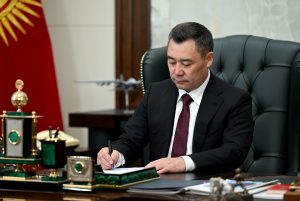On June 25, Kyrgyzstan’s parliament adopted a new mass media law that will subject all publications, including online outlets, to mandatory registration, and bar foreign participation in founding media outlets. In doing so, the legislature rejected a compromise draft, the product of two years of work by a special commission that included journalists.
If signed into law by Kyrgyz President Sadyr Japarov, all websites would be considered mass media and be required to register with the government in order to operate legally. As RFE/RL’s Kyrgyz Service, Azattyq, reported, “The Cabinet of Ministers will receive exclusive powers to determine the procedure for registering, re-registering, and terminating the activities of media outlets. In other words, it is the state agency that will essentially decide who in Kyrgyzstan can publish information and who cannot.”
Last minute amendments to the draft removed language that made registration voluntary. MPs also inserted a tighter restriction on foreign involvement in Kyrgyz media, barring foreigners and companies with more than 35 percent foreign participation from founding media outlets in the country.
These changes effectively revive in the draft – technically in its sixth iteration – the very issues that drew the greatest outcry in the original version. Mandatory registration, critics argue, could be easily used as a weapon to control media outlets. Reporting on sensitive topics, including government corruption, becomes immensely more risky when a publication’s registration can be revoked at the whim of the cabinet.
The Japarov administration has sought to update the country’s mass media law since coming to power officially in early 2021. The government has argued that the existing mass media law, which dates to 1992, is outdated. But a draft submitted in September 2022 instigated an immediate backlash from media and human rights organizations.
The Adilet legal clinic, a Kyrgyz human rights organization, analyzed the initial draft law and concluded that there were “serious risks of improper and unacceptable derogations from human rights guarantees of freedom of expression.”
In December 2022, the Japarov administration established a working group to finalize the law. The working group included several lawyers from Adilet, as well as the founders and top editors from several notable Kyrgyz media outlets, such as 24.kg, Kaktus.media, and PolitKlinika.
In the working group’s first six months, as 24.kg reported at the time, only two meetings were held.
The Kyrgyz government sought an opinion from the Venice Commission – an advisory body made up of independent experts on constitutional law and the impact on democracy – in May 2023 when the a new version of the law was submitted to parliament. The commission’s opinion, issued in October 2023, was clear: “If the current version of the Draft Law is adopted, it could lead to violations of the rights to freedom of expression and have grave consequences for the media as the public watchdog in the country.”
Meanwhile, Kyrgyzstan’s media faced escalating pressure from the government – even outlets attempting to cooperate with the government in updating the country’s media laws. A week after yet another version of the media law was submitted to parliament in early January 2024 – a draft in which very little was changed – Kyrgyz authorities raided the offices of 24.kg, briefly detaining chief editors Anton Lymar and Makhinur Niyazova. Niyazova was a member of the working group. The same day, 11 other journalists were detained.
In March 2024, Japarov’s administration withdrew the bill from parliament following a meeting between the president and more than 40 representatives of Kyrgyzstan’s media sector. The Kyrgyz president’s press secretary posted on Facebook that Japarov had listened to the media representatives and instructed that the draft law be further revised, taking into account their proposals.
A July 2024 article on 24.kg analyzed the sixth version of the draft, calling it “imperfect, but a compromise.” The article highlighted the cancellation of mandatory registration, the exclusion of clauses barring foreign ownership, and a handful of other controversial provisions relating to responsibility of journalists. The draft also had been updated at that point to require government authorities to respond to journalists in a timely manner.
That spirit of compromise appears to have vanished nearly a year later.
The Media Action Platform of Kyrgyzstan, a coalition of media outlets and journalists, called it “puzzling” that four deputies who “did not participate in the working group, were not present at the parliamentary hearings, and have no professional relationship with the media sphere” suddenly made proposals that once again tightened restrictions on the media, erasing years of work toward a compromise to modernize the country’s media law without restricting free speech.
The activists complained that the parliament was violating the principles set out by Japarov that “the law on the media should be written by professionals in close cooperation with the media industry” and called on the president to not sign the bill into law.

































